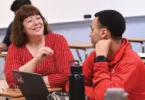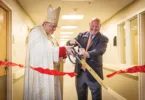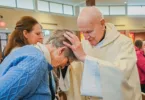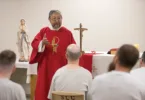by Laurie Ghigliotti
Special to The Leaven
ATCHISON — Political science professor Dr. John Settich of Benedictine College here is so sure that Roe v. Wade will someday be overturned that he talks in terms of “when,” not “if.”
“When” that moment comes, moreover, Kansas might be just a little bit readier, thanks to the work of his Public Policy Analysis class.
Several states have already put conditional enactment laws, also known as trigger laws, into place in the event that the 1973 Supreme Court decision is overturned. Such trigger laws would put state regulations dealing with abortion into place, contingent on the fall of Roe v. Wade.
Several students in Settich’s class worked on just such a trigger law for Kansas and presented their research and a proposed bill in a forum on April 18 that drew students, pro-life workers, members of the community, and even a member of the state Legislature.
In their presentation, the students gave an overview of the events leading up to the Supreme Court decision that led to legalized abortion on demand. The students also presented their thoughts on why the tide of public opinion has changed, creating a social and political climate in which pro-life legislation is more likely to be adopted.
Ryan Johnson, a member of the panel, said he believes that if more states pass their own trigger laws, the Supreme Court could be more likely to overturn Roe v. Wade. The group’s proposed law would make performing an abortion a felony, except when the physical life of the mother was in jeopardy.
According to the students’ research, advances in science have brought a clearer understanding of when life begins, as the age of fetal viability is pushed back.
Kansas has historically been at the forefront of the abortion issue, said Settich. Kansas and New York were the first states to decriminalize abortion, he said, “not to set up an abortion free-for-all, but to be able to set up regulations to protect women.”
David Kneusel, a student from Denver, agreed that Kansas is still on the forefront.
“Kansas law is presently the most pro-life in the nation,” Kneusel said. “Our proposed law protects fetuses and provides for their personhood from conception.”
Chase Brunick, lead presenter and a student from Phoenix, noted in his portion of the presentation that overturning Roe v. Wade would not end the pro-life battle.
“It would fall back on each state to regulate abortion,” Brunick said.
That’s where the application of a trigger law becomes an asset.
In the question-and-answer session that followed, the panel heard from members of the community and other students, as well as people with expertise in the pro-life arena. In attendance were Kathy Ostrowski, legislative director for Kansans for Life; Michael Heim, senior analyst, Reviser of Statutes office; Kansas House Rep. Lance Kinzer, R-Olathe; Ron Kelsey, archdiocesan pro-life office consultant; and Father Matthew Habiger, OSB, nationally known pro-life and marriage and family advocate.
During the discussion that followed the panel’s presentation, Father Matthew reflected on the challenge of changing public opinion.
“The most difficult thing is to retrieve respect for the personhood of the unborn,” he said.
Kinzer was in agreement.
“It’s a matter of changing human hearts,” he said. “We all play a role in building a culture of life.”
Some in the audience took issue with the exception to the proposed law and the discussion that followed illustrated the difficulty of writing legislation that protects the unborn in a way that is likely to make it through legislative hurdles and into law.
Ostrowski, for example, was not convinced that a trigger law would be the preferred strategy in the battle against abortion.
“We are all in agreement. We want to move in the direction of protecting life,” she said. “People are always looking for that silver bullet, but we should focus on incremental change. If we don’t do it incrementally, the risk is more division.”
While Brunick and his team learned more about the issues in preparation for the forum, the chance to present it to experts — and receive their feedback — was invaluable.
“I, and all of the students on the panel, feel like we have a much greater understanding of what the pro-life movement is about and what kind of progress can be made,” said Brunick. “I have some ideas about where I can go with the research and continue this project beyond the Public Policy Analysis classroom.”
“We all feel like there is much work to be done for this movement,” he concluded. “Hopefully, we have added something that is helpful.”






